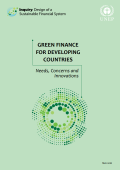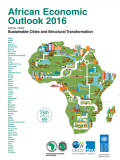The Green Economy (GE) paradigm aims to reconcile environmental and socio-economic objectives. Policies to deploy renewable energy (RE) are widely perceived as a way to tap the potential synergies of these objectives. It is, however, still largely unclear whether the potential of simultaneously achieving both environmental and socio-economic objectives can be fully realized, and whether and how multiple objectives influence policy design, implementation, and evaluation. The paper aims to contribute to this aspect of GE research by looking at selected country experiences of renewable energy deployment with respect to the socio-economic goals of job creation or energy access. Across the cases examined, the reseachers find the following implications of relevance for the GE framework: First, they confirm the important role of governmental action for GE, with the specific need to state objectives clearly and build monitoring capacity. Second, consistent with the “strong” green growth variant of GE, some of the cases suggest that while renewable deployment may indeed lead to short-term socio-economic benefits, these benefits may not last.
Public-private partnerships (PPPs) are a relatively recent phenomenon in the irrigation sector; the El Guerdane project in Morocco is the first of its kind worldwide. Implemented in 2008, it now provides water to 10,000 ha of highly lucrative citrus fruit plantations. International development banks present this project as a success story, but results in terms of local development have been at best mixed. While some farmers have benefited from the initiative, others have experienced increased marginalization from water, fertile land, and development. Based on extensive field research in the El Guerdane area between 2005 and 2013, the present paper identifies three key critical issues posed by this PPP: partly negative effects on livelihoods and socioeconomic development; an unequal sharing of costs, benefits and risks between public and private partners; and uncertain environmental impact. Based on this analysis, the authors reflect on the significance of the project for the evolution of economic and political power relations in Morocco. This paper is only available in French.

Green finance is a strategy for financial sector and broader sustainable development that is relevant around the world. But the context differs considerably for different countries. Developing countries, notably those with underdeveloped financial systems, face particular challenges in financing national development priorities.
Broadly, concern and action to align financing to sustainable development is concentrated in three areas:

The African Economic Outlook (AEO) 2016 presents the current state of economic and social development in Africa and projects the outlook for the coming two years. The AEO is a product of collaborative work by three international partners: the African Development Bank, the OECD Development Centre and the United Nations Development Programme.
The AEO 2016 shows that the continent is performing well in regard to economic, social and governance issues and has encouraging prospects for the near future. With its special theme on sustainable cities and structural transformation, this edition looks closely at Africa’s distinctive pathways towards urbanisation and at how this is increasingly shifting economic resources towards more productive activities.
In order to achieve a 50 percent reduction in carbon dioxide emissions by 2050, total financing to 2050 of around EUR 30 trillion will be required. The United Nations Framework Convention on Climate Change has concluded that a significant majority of this investment will need to come from the private sector. Public Finance Instruments for low-carbon development are publicly backed interventions that help to close financing gaps, overcome market barriers, and accelerate market uptake of low-carbon measures. This report has been prepared by Frankfurt School of Finance and Management in partnership with the Basel Agency for Sustainable Energy, drawing on the best up-to-date research and experience in the field.
